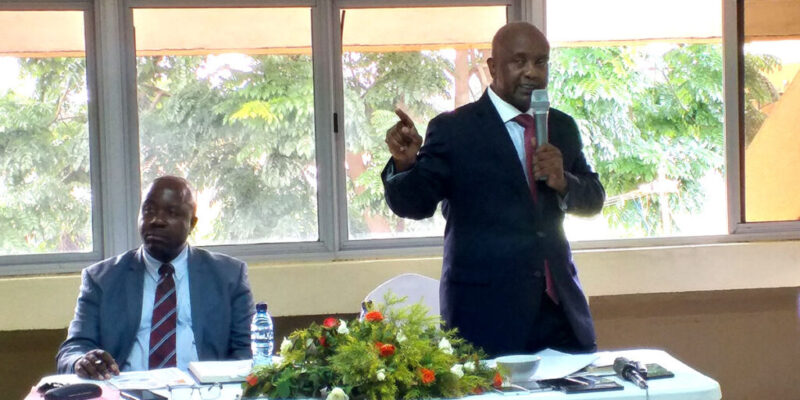Zambia’s annual inflation rate has declined to 9.8 percent in June due to price movements of selected food items. This is as the country recorded K40.8 million trade surplus.
The annual inflation for May 2023, slowed down to 9.8 percent from 9.9 percent recorded in May 2023, Zambia Statistical Agency (ZamStats) interim statistician General, Mulenga Musepa, said.
Read More:Zambia’s annual inflation rate dips to 9.9%, as country records K.5bn trade deficit
This means that on average, prices of goods and services increased by 9.8 percent between June 2022 and June 2023.
Addressing journalists in Lusaka on Wednesday, Musepa indicated that annual food inflation for June, 2023 remained at 11.2 percent compared to 11.6 percent the previous month.
He said this means on average prices of food items increased by 11.2 percent between June 2022 and June 2023.
Musepa said the outturn was mainly attributed to price movements in cereals, meat, milk, vegetables, cooking oil and live chicken.
He said annual non-food inflation for June increased to 7.8 percent from 7.6 percent in May 2023.
This development was mainly attributed to increases in prices of non-food items such as purchase of motor vehicles, accommodation services, restaurant and hotel services.
He said that of the overall 9.8 percent annual inflation, food and non-alcoholic beverages group contributed 6.5 percentage points, while non-food items accounted for 3.3 percentage points.
“Of the 3.3 percentage points, housing, water, electricity, gas and other fuels contributed the highest at 1.0 percentage points followed by transport and clothing and footwear at 0.8 and 0.5 percentage points, respectively,” Musepa said.
He added that the rest of the non- food group accounted for the remaining 1.0 percentage points.
Musepa indicated that Lusaka province contributed the highest at 3.2 percentage points to the overall annual inflation of 9.8 percent in June 2023.
Copperbelt and Eastern provinces was at 1.6 percentage points
He said Central and Eastern provinces contributed 1.0 percentage points each, while North-western province had the lowest contribution of 0.3 percentage points.
On trade, Musepa indicated that cumulative total trade for the period January to May 2023 was K168.0 billion, while that of 2022 for the same period was K148.0 billion, representing a 13.6 percent increase.
“The total volume of exports via all modes for the period January to May 2023 was K85.3 billion. Road transport accounted for highest K43.1 billion representing 50.5 percent share.
“Rail transport was second at K3.0 billion and air transport was third accounting for K2.2 billion, while other modes accounted for K37.1 billion,” he said.
Musepa said total value of imports via all modes of transport for January to May 2023 was K82.8 billion.
In terms of volumes, he said a total of 2,853.9 million tonnes of imports was recorded for the period January to May 2023, of which road transport accounted for 1,759.9 thousand tonnes, representing the highest share at 61.7 percent.
Musepa said railway transport accounted for 131.4 thousand tonnes, representing a share of 4.6 percent in the period under review.
He added that Zambia recorded a trade surplus of K40.8 billion in May 2023 compared to a deficit of K457.7 million in April 2023.
Exports mainly comprising domestically produced goods, increased by 13.1 percent to K17,121.2 million in May 2023 from K15,136.1 million in April 2023, Musepa noted.
This was mainly on account of a 16.0 and 14.2 percent increases in export earnings from intermediate goods and capital goods respectively.
He said imports decreased by 9.5 percent to K17,080.4 million in May 2023, from K15,593.7 million in April 2023, and that this was mainly as a result of 2.9, 27.9, and 4.6 percent increases in import bills of intermediate goods, consumer goods and capital goods respectively.
WARNING! All rights reserved. This material, and other digital content on this website, may not be reproduced, published, broadcast, rewritten or redistributed in whole or in part without prior express permission from ZAMBIA MONITOR.












Comments